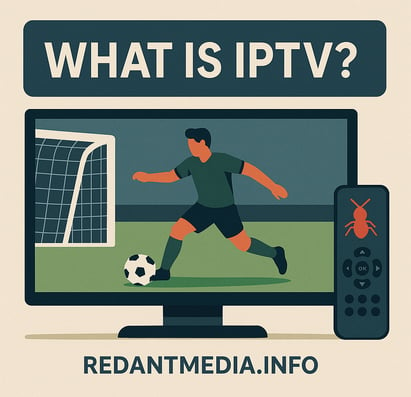What is IPTV?
Blog post description.IPTV, or Internet Protocol Television, is a modern way to watch TV using your internet connection instead of traditional cable or satellite. It delivers live channels, on-demand shows, and interactive features to any device, offering flexibility and convenience for today’s viewers
Rachel Brown
6/13/20255 min read


IPTV, short for Internet Protocol Television, is the delivery of television content over the internet instead of through traditional terrestrial, satellite, or cable formats. This technology has transformed how people access and enjoy TV, offering a more flexible and personalized viewing experience compared to older methods.
The Basics of IPTV
At its core, IPTV uses the same internet protocols that power the web to transmit TV programs and video content directly to users. When you watch IPTV, your device—whether it’s a smart TV, computer, tablet, or smartphone—receives video streams as data packets over your broadband connection. This process allows you to watch live TV, on-demand movies and shows, and even interactive content, all through a single platform.
Unlike traditional TV, where all channels are broadcast simultaneously and viewers select from a fixed lineup, IPTV operates on a request-based system. Only the program or channel you choose is streamed to your device, which means you get exactly what you want, when you want it, without unnecessary clutter.
How IPTV Works
The journey of IPTV content begins with content providers, such as TV networks or studios, who encode their programs and store them on servers. These servers are connected to a broadband network, and when you select a channel or show, the content is sent to your device in the form of data packets. Your device then decodes these packets and displays the video for you to watch.
IPTV can be delivered over both public and private networks. Many telecom and cable providers offer IPTV as a managed service, meaning they control the network and prioritize video traffic to ensure smooth, high-quality streaming. This is different from over-the-top (OTT) streaming services like Netflix or Hulu, which use the open internet and may be subject to buffering or quality issues.
Key Components of IPTV
Several essential components work together to make IPTV possible:
IPTV Head-End: The central hub where all content is collected, processed, and encoded for IP transmission.
Content Delivery Network (CDN): A network of servers distributed geographically to ensure efficient and reliable content delivery.
Middleware: Software that manages user interaction, provides the electronic program guide (EPG), and facilitates communication between the user’s device and the server.
Set-Top Box or IPTV Receiver: A device that connects to your TV and internet, decodes the IPTV signal, and displays it on your screen. Many modern devices can decode IPTV streams natively.
Broadband Internet Connection: A reliable, high-speed internet connection is essential for IPTV. The higher the bandwidth, the better the video quality and the smoother the streaming experience.
Types of IPTV Services
IPTV offers a variety of viewing experiences, each tailored to different user needs:
Live Television: Watch live TV channels in real time, just like traditional cable or satellite.
Video on Demand (VOD): Choose from a library of movies, TV shows, and other content to watch whenever you want.
Time-Shifted TV (Catch-Up TV): Watch previously aired programs at your convenience, such as starting a live football match from the beginning even if it’s already halfway through.
Interactive TV: Pause, rewind, and fast-forward live TV, access additional information about programs, participate in polls, or even shop directly from your TV.
Advantages of IPTV
IPTV offers numerous benefits over traditional TV delivery methods:
Flexibility and Convenience: Watch IPTV on any device with an internet connection, including smart TVs, computers, tablets, and smartphones.
Personalized Viewing: Choose what you want to watch, when you want to watch it, without being limited to a fixed channel lineup or broadcast schedule.
Interactive Features: Pause, rewind, and fast-forward live TV, access on-demand content, and interact with programs in ways that traditional TV simply can’t offer.
High-Quality Streaming: Managed IPTV networks prioritize video traffic, ensuring smooth, high-definition streaming with minimal buffering or interruptions.
Integration with Other Services: IPTV can be integrated with other digital services, such as video conferencing, home automation, and smart home devices, creating a seamless multimedia experience.
IPTV vs. Traditional TV and OTT
It’s important to distinguish IPTV from both traditional TV and over-the-top (OTT) streaming services:
Traditional TV: Relies on coaxial cables, satellite signals, or over-the-air broadcasts. All channels are transmitted simultaneously, and viewers select from a fixed lineup. There is little to no interactivity, and on-demand content is limited.
IPTV: Uses the internet to deliver TV content. Only the selected channel or show is streamed to your device, offering greater flexibility, interactivity, and personalization. IPTV is often provided over a managed network, ensuring high quality and reliability.
OTT Streaming: Also uses the internet, but content is delivered over the open internet rather than a managed network. Examples include Netflix, Hulu, and YouTube. While OTT offers similar flexibility, it may be subject to buffering and quality issues, especially during peak times.
The Evolution and Future of IPTV
IPTV has come a long way since its early days in the late 1990s, when it was limited by slow internet speeds and rudimentary technology. The widespread adoption of broadband and the rise of smart devices have propelled IPTV into the mainstream, making it a viable alternative to traditional TV.
Looking ahead, IPTV is poised to play an even greater role in the media landscape. Advances in video compression, 5G networks, and cloud-based streaming are making IPTV more accessible and reliable than ever before. The integration of artificial intelligence, personalized recommendations, and augmented reality could further enhance the IPTV experience, making it an essential part of modern entertainment.
Common Use Cases for IPTV
IPTV is not just for home entertainment. It is widely used in a variety of settings:
Residential: Increasingly popular in homes, offering a flexible alternative to cable and satellite TV.
Hospitality: Used in hotels, resorts, and cruise ships to provide guests with a wide range of channels and on-demand content.
Healthcare: Delivers educational content, entertainment, and patient information to bedside screens in hospitals and clinics.
Education: Used by schools and universities to stream lectures, training videos, and educational programs to students.
Corporate: Used for internal communications, training, and digital signage in offices, waiting areas, and common rooms.
Security and Privacy Considerations
While IPTV offers many benefits, it also raises important questions about security and privacy. Because IPTV relies on internet connectivity, it is vulnerable to cyber threats such as hacking, unauthorized access, and data breaches. To protect users, reputable IPTV providers implement robust security measures, including encryption, secure authentication, and network monitoring. Users are also advised to use strong passwords, keep their devices updated, and consider using a virtual private network (VPN) for added security, especially when accessing IPTV services over public Wi-Fi.
Conclusion
IPTV represents a significant leap forward in how we consume television and video content. By leveraging the power of the internet, IPTV delivers live, on-demand, and interactive programming to any device, offering unparalleled flexibility, convenience, and personalization. Whether you’re at home, in a hotel, or on the go, IPTV ensures that your favorite shows, movies, and live events are always within reach.
As technology continues to evolve, IPTV is set to become even more sophisticated, integrating with smart home systems, artificial intelligence, and next-generation networks. For viewers seeking a modern, flexible, and interactive TV experience, IPTV is the future of television.
